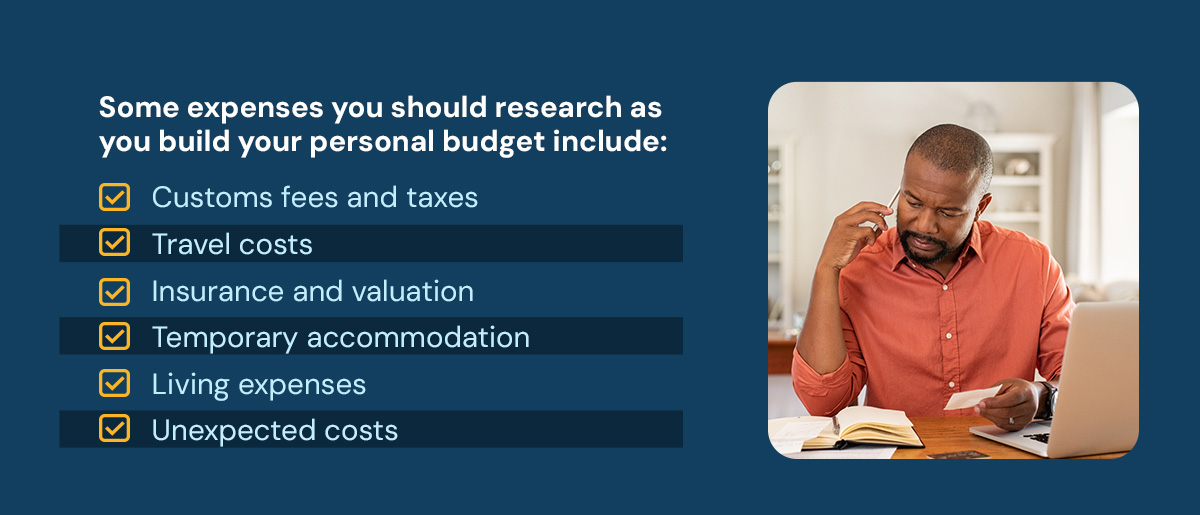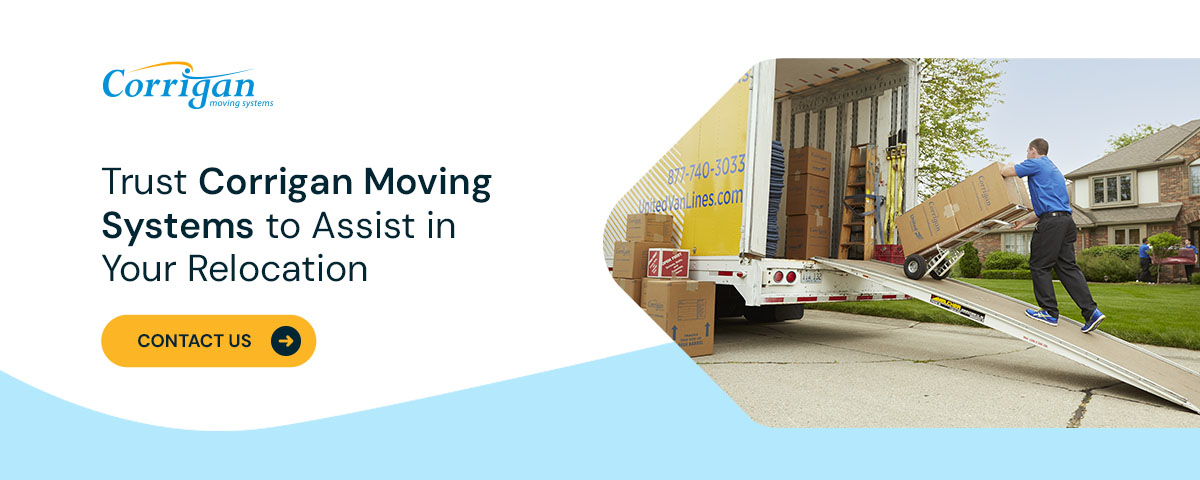
Proper planning is key to a smooth move, especially an international one — and budgeting is a crucial aspect to consider. Discover how to budget for an international move, from understanding common costs to planning for delays.
Why Budgeting Is Essential for Your Move
Budgeting is a great way to start your new chapter on the right foot. Crafting a budget allows you to:
- Avoid overspending: Budgeting allows you to find accommodations and services within your price range to avoid overspending. Early planning and cost estimates can also help you find deals or packages to put money back in your wallet.
- Reduce stress: Finances can quickly become a stressor if you lack the tools and resources to control your situation, especially during a move. Budgeting allows you to understand the money you have coming in and make conscious decisions about what you spend so there are fewer surprises.
- Make informed decisions: A comprehensive budget empowers you to make informed decisions that benefit you in the long run. Having a budget in mind can help you find the right place to live and set career goals once you get settled in. You may even be able to find opportunities to save money or cut costs on unnecessary expenses along the way.
Understanding Common Moving Costs
One of the best tips for budgeting for an international move is to understand common moving costs. Costs will greatly vary by country, service provider and similar factors. Some expenses you should research as you build your personal budget include:

- Customs fees and taxes: International charges should be among your first considerations when moving. Research the customs regulations so you recognize the fees and charges you might encounter, like value-added taxes and import duties.
- Travel costs: Consider how you’re going from point A to point B. The costs of connecting flights, transport from the airport and other elements of travel should be built into your budget. Be sure to consider any special circumstances, such as traveling with a pet or whether you’ll need to a place to stay between travel days.
- Insurance and valuation: Examine insurance and valuation options. Valuation will protect your belongings if something gets lost, broken or damaged during your travel, but you can find varying levels of coverage to support your needs. Verify your medical and property insurance policies to see if coverage will apply in your new home. If your budget allows for additional coverage, it’s a good idea to safeguard against unexpected events.
- Temporary accommodation: If you haven’t decided on a place to live before your move, be sure to consider temporary accommodation. Research rates and options well before your moving day. You may not be able to move all your belongings into your temporary home, so you might need to consider storage costs, too.
- Living expenses: Gather an idea of the cost of living in your new location, from the average costs of groceries to transportation, schooling and basic services. You can use these numbers to create a day-to-day budget that will make you feel more comfortable with your finances as soon as you arrive.
- Unexpected costs: At the end of the day, it’s impossible to account for every little detail on your own. Creating a buffer for unexpected costs can help you bounce back from surprises without adding mounds of stress. Some unexpected costs to consider include food, shipping fees, currency exchange rates and hidden fees from some service providers.
How to Budget for an Overseas Move With the Risk of Delays
Delays can be an unfortunate reality during the moving process. Thorough planning can help you avoid some, but others may be out of your control — including changes in flights or the weather that leave you looking for last-minute accommodations.
You can offset the financial strain and stress of delays by creating a buffer in your budget for unexpected costs. As a general rule of thumb, set aside roughly 10% to 15% of your budget for unforeseen expenses.
How to Budget With an International Moving Company
Working with a professional moving company can add to your costs, but it’s worth having a partner to ease the transition. The right company will provide comprehensive services that deliver peace of mind, reduce the risk of delays and make it easier to budget. Here’s how to get started:
- Find a reliable company: Finding a reliable company is the first step. You need a team with experience, accreditations and global reach. These metrics depict a company’s ability to meet your needs, adhere to regulations and deliver exceptional support. Look for a mover with lots of experience and global network locations to back you up.
- Ask for advice: The best way to inform your budget is to ask for advice from your moving team and learn more about common moving costs. An experienced company will have moving resources to help you stay organized and let you know what to expect throughout the process.
- Opt for tailored solutions: One-size-fits-all solutions are rarely suitable, especially for something as complex as moving. Look for a company that offers customized quotes, tailored services and processes that reflect your needs.
An International Moving Budget Checklist
To make your move as seamless as possible, consider creating a checklist that reflects your unique needs. Beyond the common travel expenses we discussed earlier, extra elements to add to your budget include:
- Packing supplies: From boxes to labels, every little purchase adds up. See whether the moving company you work with offers packing services to reduce surprise costs on these supplies.
- Utility and service transfers: Whether you’re moving into a home you own or renting a space, you’ll likely need to set up utility services. Some companies may have startup fees or require you to cover the cost of equipment at installation, so be sure to research your options beforehand.
- Cleaning and repairs: When leaving your old home, it’s important to clean and repair what you can — especially if you have a security deposit to get back. Your new home might need some attention once you move in, too. Even if you walk into a sparkling new space, moving boxes and unpacking can get messy at times, so plan to spend some cash on wipes, brushes and cleaning solutions.
- Miscellaneous items: You’ll probably encounter a few miscellaneous costs during your move. Think about food and drink when you’re traveling and during the days you spend settling into your new home. Consider if you’ll need pet care, tips for service providers, parking fees, laundry, and similar items or services so you can plan ahead.
Trust Corrigan Moving Systems to Assist in Your Relocation

At Corrigan Moving Systems, our expert movers have decades of experience and lots of international relocation tips to share. We’re here to simplify your international move with comprehensive services so you can focus on planning and budgeting. Request a custom quote to discover how we can help!

